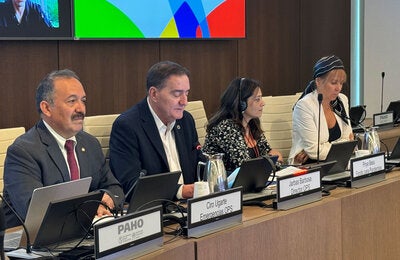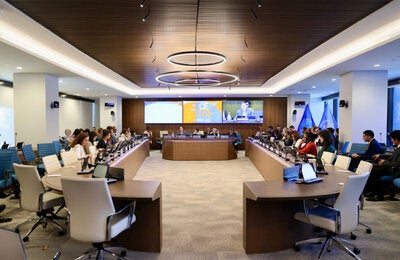

Despite the growing efforts of public and social health to decrease violence against women, it remains a major public health issue in Latin America and the Caribbean.
El Paso, TX, May 25, 2011 (PAHO/WHO) — Despite the growing efforts of public and social health to decrease violence against women, it remains a major public health issue in Latin America and the Caribbean.
In recent studies, about 7 to 24 percent of women in twelve Latin America and the Caribbean countries have been victims of physical violence by their partners in the last year, and between 5 and 15 percent indicate that it has been against their will, and that they have been forced to have sex with their partners during their lifetimes. However, the proportion of women reporting violence inflicted by their partner is much lower.
The damage caused by intimate partner violence and sexual violence can last a lifetime and extend to generations, with adverse effects on health, education and employment. Consequently, primary prevention of such violence can save lives, as well as protect the physical and economic welfare and development of individuals and communities.
Therefore, the Pan American Health Organization / World Health Organization, reach out to partner and sexual violence, with prevention activities, by considering it a major global health and human rights' issue. By focusing on the promotion, providing health and legal services to ensure the safety of victims of violence, once disclosed, or detection of violence in the context of health services, emphasizing primarily on primary prevention of intimate partner violence and sexual violence.
Additionally, WHO has developed a guide, Preventing intimate partner violence and sexual violence against women: taking action and generating evidence, which has become a key tool in preventing sexual partner violence for researchers in the prevention of violence, practitioners and policy makers, because it provides a planning framework for the development of policies, strategies and programs. This guide has been the basis for the workshop held in El Paso, Texas. This workshop brings together participants from seven countries of the Americas.
Wednesday 25th to Friday 27th of May 2011
8:30 AM to 4:30 PM
Hotel Camino Real
Downtown El Paso, TX
The coordinators and facilitators of the workshop are Dr. Claudia Garcia Moreno, Senior Advisor on Gender, Reproductive Rights, Sexual Health and Adolescence from WHO in Geneva, Alessandra Guedes, Regional Adviser on Domestic Violence and Dr. Maristela Monteiro, Senior Advisor on Alcohol and Substance Use, both of PAHO headquarters in Washington, and Dr. Gustavo Iturralde Health Promotion Officer PAHO / WHO Office of the United States-Mexico Border. Participants were selected to support the country offices of PAHO / WHO, with multidisciplinary profiles for a comprehensive approach to this problem, from the standpoint of public health and human rights.
RELATED LINKS:
- UNiTE to End Violence against Women — United Nations Secretary General's Campaign
- Únete Latino América y El Caribe ¡YA NO Más Violencia Contra las Mujeres! (Anuncio de Servicio Público)
- WHO Violence against women inflicted by partner
- WHO Guide to intimate partner violence and sexual violence against women
- Photos of the first two-day workshop
For more information please contact Lorely Ambriz Irigoyen, M.S.I.S, Knowledge Management & Communication Advisor, Pan American Health Organization (PAHO) - United States-Mexico Border Office, tel. (915) 845-5950 Ext. 42523, mobile (915) 449-3040, fax (915) 845-4361. www.fep.paho.org - www.infofrontera.org



